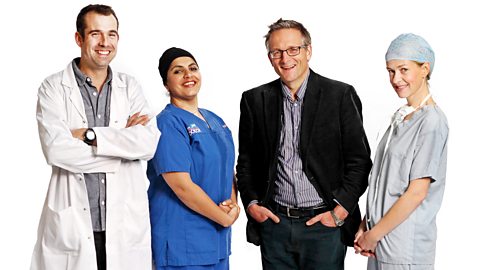A few notes on the first in the new BBC series, broadcast tonight. It was of particular interest to me as it dealt with the effectiveness of whey protein as a muscle builder, how to slow down or even reverse muscle loss as you get older and what are the best times to exercise for weight loss with respect to eating. It also looked at the claims of taking fruit smoothies as a source of antioxidants. To summarise the findings:
Protein powders do not increase muscle growth providing you are getting sufficient protein in your diet. Any surplus is burnt as energy, is stored as fat, or is peed out of you system. The role of protein powder as part of a weight loss strategy was not considered in the programme. However, tests showed that protein supplements pass into your muscles in about 3 hours and the uptake is more in muscles that have been exercised.
Muscle loss starts in the over 40s at a rate of about 1% per year and after 50 at about 5% per decade. This is inevitable and is part of the normal ageing process – sarcopenia. This leads to loss of strength and power output as well as part of the reason balance deteriorates with age. The programme demonstrated how a few simple exercises done in the home without special equipment and generally without raising a sweat (so presumably not a cardiovascular workout) enabled a group of late middle aged and older subjects, over a 4 week period, have a 3% increase in muscle volume, a increase in strength of 12% and a power output increase of 13%. No special diet conditions were set.
The effects of exercise for fat burning were measured comparing subjects that exercised before eating in the morning and those who exercised after. Apparently the fat burning effect takes place in the hours after exercise and not so much during. This was not explained but it may be because the fat is used to replace carbohydrate energy stores in the blood. The effect was about 3% to 8% additional fat burn for men who exercised before eating and the same for women who exercised after eating. This is a new finding and may be explained by men having more muscle than women and the way the different sexes utilise energy.
Antioxidant drinks have no effect. If anything they produce an antioxidant spike that the body responds to by decreasing the amount of internally produced antioxidants so that the normal level is reduced and does not recover for 24 hours. So the supplements are counter productive. In any case, free radicals are necessary as they signal muscle damage has been done and repair mechanisms kick in. The balance between antioxidants and free radicals is managed by your body automatically.
The final snippet of information concerned looking at if being overweight was necessary a bad thing and whether fat loss was always something beneficial to strive for. Fat round the bum and legs, hips generally, was not seen as particularly dangerous but round the stomach and abdomen definitely bad. BMI is still seen as a reliable measure of weight for mos normal human beings and under 25 is the recommended target. However, between 25 and 30 is OK for more elderly people, say over 65. Bearing in mind BMI is sensitive to the ratio between muscle and fat, in older people a highish BMI might be because muscle loss effects the ratio rather than just a matter of excess fat.
Finally there was advice about reheating food. Generally OK but be careful with rice because the bacteria present, although can be killed by thorough reheating, may have produce toxic spore that are immune to heat.
Trust me, I’m a doctor web site.

